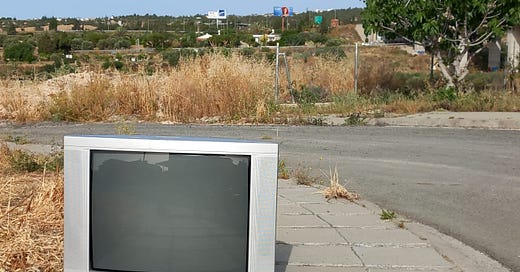Dear friends,
This weekend my son turns five, an event he’s been keenly anticipating for about ten months.
‘You’ll never be four again,’ my wife said to him yesterday.
‘Unless,’ he replied (there’s often an ‘unless’ these days), ‘unless when you get too old, the ghost of you rips your beard off and you start your life again in your mummy’s tummy.’
‘The same life or a different life?’
‘The same life!’
We recently had a fortnight’s family holiday. Holidays with our son are like being on a retreat with a charismatic and unstable guru. One minute he’s looking into your eyes, uttering profound statements, the next he’s pretending to be a koala, and the next he’s behind the sofa screaming.
A few months ago I wrote about our son’s meditations on time. Recently he’s moved on to questions of being.
On the macro scale, he’s been pondering Existence full stop. ‘What if I didn’t exist in this universe?’ he wondered aloud. And the other day he declared that ‘Nothing is something and something is nothing.’
On the micro level, he’s become very interested in categories: what it means for a thing to be a particular kind of thing.
‘You can’t play with that,’ he said to his sister recently. ‘It’s not made of toy!’
Likewise, reflecting on the difference between the animals people eat and those they tend not to, he concluded that ‘some animals have got meat inside them.’
He also recently asked whether ‘rabbits are the kings and queens of ears’ and whether ‘a Granpa can have a pet Granpa’ – questions which may or may not have a bearing on all of the above.
I love witnessing my children’s working-out of the world, their attempts to sift and sort the facts and phenomena presented to them - and the moments when their categories suddenly expand or collapse.
A couple of days ago I told my children that an onion is a kind of reptile. Even when he can tell I’m joking, my son has to check just in case.
‘Is that for real life?’ he asks.
One of the things that I appreciate about living in a different country is the opportunity to join my children in their uncertainty – to encounter cultures, histories, landscapes and creatures I don’t understand, systems of value and power I struggle to make sense of.
I can’t imagine my way back to the radically open, constantly shifting perspective of a four-year-old, but moving from South London to a small Cypriot village has reminded me of the distinct pleasures and possibilities of incomprehension, and the challenge of slotting the world into categories.
The name of our village means ‘empty’ or ‘barren’ in Greek, although it seems that it has rarely been either of those things. We live on a patch of the island where people have lived for at least six thousand years. A hundred metres from our house is an active archaeological dig, which is gradually uncovering the buried walls of an ancient settlement. When I go jogging each morning, I run along tracks littered with the biscuity fragments of ancient ceramics.
Our house is a modern white box at the edge of a village that was still a traditional agricultural community fifty years ago, and where shepherds still bring their goats to graze on the patch of grass below my office.
Today the village is also a suburb, a twenty-minute drive from a booming coastal city. New builds are popping up everywhere. Ex-pat Russians and Brits live alongside families who have lived here for generations. Archaeologists rub shoulders with property developers. Old red tractors are overtaken by black and silver SUVs.
It’s a hard place to get your head around, a place that is many places all at once: rural village, commutable suburb, permanent archaeological site, permanent building site. The ground here is always opening and closing. Walls are always being built and discovered. Objects are always being dumped or dug up.
The valley below the village is also many things at once: farmland, orchard, dammed river, dry floodplain, fly-tipping hotspot, investment opportunity, commuter housing estate waiting to happen. Rotten sofas sit outside chalcolithic cave dwellings. Ancient ruins jostle with modern rubbish. Bird song competes with motorway noise and the barks of caged dogs.
I don’t know how to make sense of the village where we live or the valley that I jog through every day. They contain the traces and ongoing presence of so many different times and forms of life. They are subject to so many shifting structures and dynamics. I don’t know how to read this place or what categories to slot anything into.
Writing about where we live in these letters, I’m finding it helpful to document this experience of incomprehension, and the gentle, ground-up process of sense-making that comes from jogging around the valley each morning.
In my next letter I’ll explore ideas of incomprehension, attentiveness and connection to place further, in dialogue with the great ecological thinker Aldo Leopold and his 1949 book A Sand County Almanac, a record of his years looking at, and living with, a patch of worn-out farmland in Wisconsin.
But to close, I’ll leave you with some more reflections from our in-house sage.
‘Is every daddy in the world vegetarian?’ my son asked.
‘Good question,’ I replied.
‘Well,’ he said, ‘my brain is thinking and thinking.’
His thinking is mysterious; just when I think I’m keeping up, I realise his words are pointing at things I can’t see.
‘Last night I had a dream that was very funny,’ he said. ‘A fish turned into a fish, a whale turned into a whale, a sheep turned into a sheep, and a human turned into a human. Isn’t that funny?’
Warm wishes,
Matt



